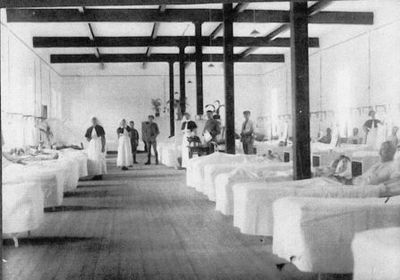Difference between revisions of "4th Australian Auxiliary Hospital"
From Our Contribution
(→Soldier Patients by date admitted) |
|||
| Line 22: | Line 22: | ||
==Soldier Patients by date admitted== | ==Soldier Patients by date admitted== | ||
*[[John Francis Grabham MM]] 4 - 30 Jan 1916 | *[[John Francis Grabham MM]] 4 - 30 Jan 1916 | ||
| + | *[[ ]] 31 Jan - 14 Mar 1916 | ||
*[[John Edwin Ffoulkes DCM]] 12 Feb - 3 Mar 1916 | *[[John Edwin Ffoulkes DCM]] 12 Feb - 3 Mar 1916 | ||
*[[John Harold Coffen]] 1 - 10 Apr 1916 | *[[John Harold Coffen]] 1 - 10 Apr 1916 | ||
Revision as of 17:41, 16 March 2018
 A ward at 4th AAH at Abbassia c1916 | |
Brief History
Opened in Abbassia, Cairo, Egypt before relocating to Welwyn, Hertfordshire, England in June 1915 where it was co-located with the 5th Australian Auxiliary Hospital which serviced officers only. Both hospitals cared for convalescents and closed on 31 Jan 1919.
Auxiliary hospitals were classified as Class A (those who took cot cases, i.e. the bedridden, from military hospitals) and Class B (for convalescent and ambulant patients). Specialised units were also set up for shell-shocked and neurasthenic patients. Some 352 auxiliary military hospitals were established in the London district.
The staff of an auxiliary hospital included a commandant (who was in charge of the hospital, but not the medical and nursing services), a quartermaster, a matron and members of the local Voluntary Aid Detachment who had been trained in first aid and home nursing. Medical care was provided voluntarily as needed by the local doctors. Discipline was less strict in the smaller hospitals than in a military hospital and the surroundings more homely
Soldier Patients by date admitted
- John Francis Grabham MM 4 - 30 Jan 1916
- [[ ]] 31 Jan - 14 Mar 1916
- John Edwin Ffoulkes DCM 12 Feb - 3 Mar 1916
- John Harold Coffen 1 - 10 Apr 1916
Notes